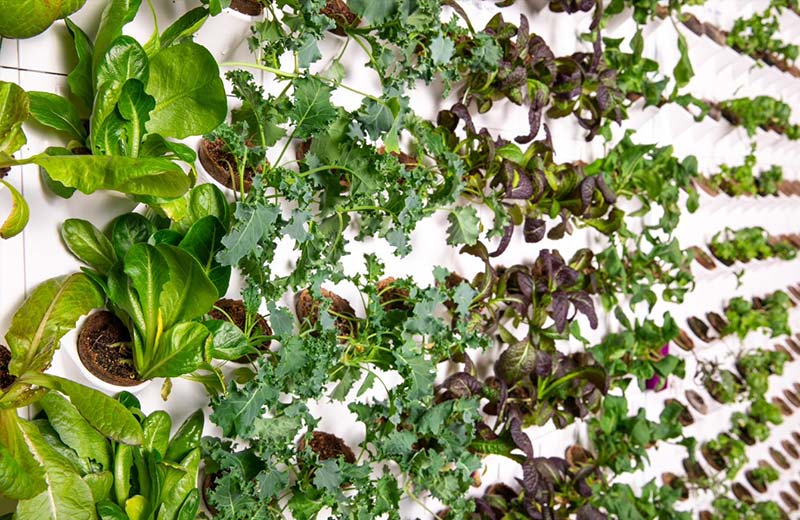Key Takeaways:
- U of T Scarborough enhances sustainability research through the installation of four Harvest Walls, donated by Harvest Today, in its campus greenhouses.
- The vertical farming systems enable controlled environment agriculture, giving researchers and students tools to study plant growth, environmental stress, and food systems.
- The initiative is led by the Office of the Vice-Principal, Research & Innovation, with contributions from industry partners including Harvest Today and SpectraGrow.
- Faculty across departments are using the walls in active research and teaching, exploring new avenues in plant biology, food innovation, and green technology.
- The project reflects U of T Scarborough’s commitment to sustainability, interdisciplinary collaboration, and real-world learning in urban agriculture.
U of T Scarborough Integrates Vertical Farming Into Research and Learning
A new collaboration is strengthening the University of Toronto Scarborough’s (U of T Scarborough) leadership in sustainable agriculture. In partnership with Harvest Today, the campus has introduced four Harvest Walls—indoor vertical farming systems now located in the university’s greenhouse facilities. The initiative provides a platform for hands-on research and innovation, furthering the university’s commitment to environmental responsibility and food system sustainability.
Supporting Sustainable Innovation on Campus
The installation was made possible through the Office of the Vice-Principal, Research & Innovation (OVPRI), with coordination led by Feihan Dai, Strategic Research Development Officer. The Harvest Walls were donated by Harvest Today, with lighting systems contributed by SpectraGrow to optimize plant growth.
“This partnership highlights our campus's commitment to driving real-world impact through research and innovation,” said Alison Mountz, Interim Vice-Principal, Research and Innovation.
A Platform for Experiential Learning and Cross-Disciplinary Research at U of T
Enhancing Student Engagement and Academic Exploration
Located in the Department of Biological Sciences greenhouse, the systems provide controlled growing environments ideal for a wide range of experiments. The project brings together students, faculty, and industry partners to explore solutions for urban food production and plant science.
“By bringing together academic expertise, industry perspectives, and community insights, we foster meaningful innovation and drive lasting societal impact,” said Andrea Charise, Associate Vice-Principal, Research and Innovation of Strategic Initiatives & Partnerships.
The greenhouses are managed by Horticulturist Andrew Cline, who ensures optimal conditions for both teaching and research. “Maintaining the system and fine-tuning environmental controls is key to ensuring a reliable, efficient growing space,” said Cline.
U of T's Faculty-Led Research: From Medicinal Plants to Food Systems
Academic Applications of the Harvest Wall Technology
Dr. Eliana Gonzales-Vigil, Assistant Professor in the Department of Biological Sciences, is using the walls to study how environmental stress affects plant defenses. Her research focuses on how plants develop protective wax barriers in response to harsh conditions.
“Vertical farming provides us with unique opportunities for research on medicinal plants and even trees,” Gonzales-Vigil explained. “The advantage is producing large biomass in a limited space.”
Meanwhile, Dr. Jeffrey Pilcher, Professor in the Department of Physical & Environmental Sciences, is applying the technology to sustainable food system research. “Having fresh, locally grown ingredients right on campus opens new possibilities for food innovation and sustainability in our kitchens,” said Pilcher.
Technology Designed for Urban Sustainability
Harvest Walls Offer Water Savings and Pesticide-Free Production
The Harvest Wall system, developed by Harvest Today, is a vertical farming technology that fits small spaces, uses 97% less water, and operates without pesticides. Crops such as peppers and cucumbers are currently growing in the units, offering both research material and food.
“We are thrilled that Harvest Walls are thriving,” said William Aitken, Director at Harvest Today. “Watching the plants flourish and knowing that faculty and students are using this technology to drive sustainability research is incredibly exciting for us.”
U of T Scarborough’s Commitment to a Greener Future
Real-World Solutions for Urban Agriculture and Food Innovation
Through this partnership, U of T Scarborough continues to position itself as a hub for sustainable innovation. The integration of vertical farming into research and teaching supports a broader mission to prepare students for challenges in environmental stewardship, urban agriculture, and food security.
“As the Harvest Wall plants thrive, so does the collaboration of researchers, students, and industry leaders that are innovating for a more sustainable future,” said Charise, reflecting the broader impact of the initiative.


